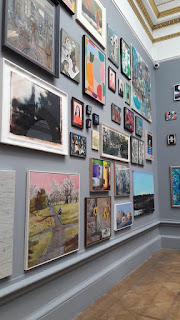Here she is having dinner with a friend, but they are discussing a previous dinner, so you get this sense of history to their relationship:
"And indeed, being so immersed, I did not notice that Paniotis went away from our encounter feeling that his life had been a failure, any more than a mountain notices a climber that loses his footing and falls down one of its ravines. Sometimes it has seemed to me that life is a series of punishments for such moments of unawareness, that one forges one's own destiny by what one doesn't notice or feel compassion for; that what you don't know and don't make the effort to understand will become the very thing that you are forced into knowledge of. While I spoke Paniotis looked more and more aghast. That is a terrible notion that only a Catholic could have come up with, he said. Though I can't say there aren't quite a few people I would like to see punished in so delightfully cruel a fashion. Those are the ones, however, who are certain to remain unenlightened by suffering to the end of their days. They make sure of it, he said, picking up the menu and turning with a lifted finger to the waiter, an immense grey-bearded man clad in a long white apron, who all this time had been entrenched so absolutely motionless in the corner of the almost empty room that I hadn't noticed him." (p.94)
Later in the conversation they are joined by another woman, Angeliki, who becomes the focus of the conversation. I was particularly taken by this passage about women's shoes, the comments about being disbarred from 'womanhood' because of what they represent:
" 'I myself,' she continued extending her silvered foot out from beneath the table, 'developed a weakness for delicate shoes when we returned to Greece. Perhaps it was because I had begun to see the virtues of standing still. And for the character in my novel, shoes like these represent something forbidden. They are the sort of shoes she would never wear. Moreover, when she does see women wearing such shoes, it makes her feel sad. She has believed, until now, that this was because she found such women pitiful, but in fact when she things about it honestly it is because she feels excluded or disbarred from the concept of womanhood the shoes represent. She feels, almost, as if she isn't a woman at all. But is she isn't a woman, what is she?'" (p.113-4)
It had something existential about it. The book it makes me think of is Albert Camus' 'The Outsider', that I read for French A level soooo long ago. In talking it's as if the woman is watching herself, examining her own reactions. It's hard to pin down why I liked the book, but when I finished it I decided I was looking forward to the next part of the trilogy to see where she takes the 'narrative' and the 'character'.

















